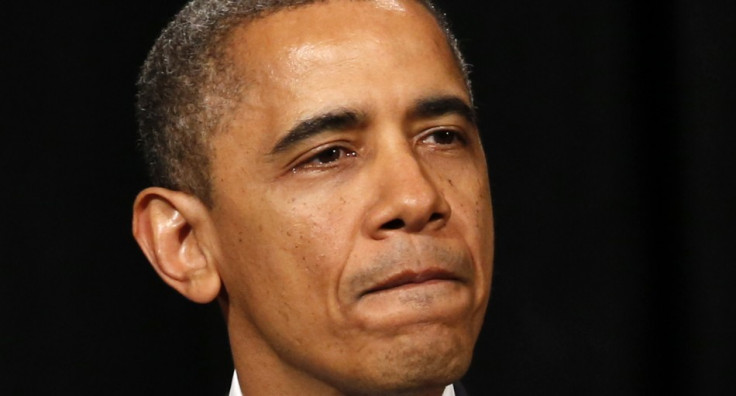Sandy Hook School Massacre: Barack Obama Faces Huge Obstacles in Reforming America's Gun Laws

When news of the Columbine massacre broke 13 years ago, the tragedy provoked almost as much shock and horror in Britain as it did in America. Now, sadly, the US school shoot-up is almost a cliché; the hallmarks of the event, from the gunman's maniacal teenage fantasies to the children hiding from death in classroom lockers, are all too familiar. For millions of British people, news of the Connecticut tragedy provoked barely a ripple of surprise.
Instead we viewed the tragedy with a cursory tut and a shake of the head, faces set in stony condescension. To us the solution to America's gun probem is obvious: if our cousins across the pond want to stop people going round shooting each other, they have to take their guns away. For those who love nothing more than ridiculing the American idiot, disparaging the country's gun policy is as easy as shooting fish in a barrel.
But when you think about it, the solution to America's gun problem isn't simple at all. In fact it's a quagmire of dogma, prejudice, rights and wrong-headed delusion. President Barack Obama may be taking tough about curbing gun ownership, but a couple of rousing speeches will do nothing to break the lethal impasse in his country's gun laws.
Any attempt to reform these laws faces three huge obstacles. First, there is the power of the industry; retail sales of new guns continue to average around $3.5 billion a year, and the figures show no sign of tailing off despite the economic downturn. In a country which is battling against recession and the jagged shadow of the 'fiscal cliff', an industry as buoyantly bullet-proof as firearms cannot simply be written off, no matter the crimes its customers have committed.
Unsurprisingly, given the money it makes, the firearms industry continues to exert huge influence in Washington. The National Rifle Association was able to spend almost $12m in the last election on mud-smearing campaigns against candidates who advocated gun control policies, meaning any politician who advocates such measures risks their own career in doing so. The NRA may have pledged to contribute to reform, but the pro-gun lobby has made these promises before, and each time has returned even more bloody-minded. If Obama wants to seize the firearms agenda, he'll have to wrest it from the Association's cold dead hands first.
Then there is the huge logistical challenge involved in taking guns off the streets, the second major obstacle blocking gun reform. It might be possible to close down the thousands of legitimate firearms retailers dotted across America, but curbing the unlicensed retailers is nigh on impossible. In fact, pro-gun lobbyists might argue that any ban on the sale of firearms would actually exacerbate the situation, because it would push weapons-seekers towards the tenebrous criminal underworld, where vendors rarely ask for ID or seek proof of sanity before they hand over a weapon.
This leads on to the related problem of how to collect the millions of guns already in circulation. America has tried gun amnesties before, with pitiful results. In 2008, for example, a Los Angeles gun amnesty was declared an overwhelming success, with a record yield. Yet it reaped only 965 firearms, from a population of 3.8 million people - if such risible harvests are anything to go by, the reformers have no chance of persuading America to disarm. And the fourth amendment of the US Constitution, which guards against unreasonable searches and seizures of property, would make it fiendishly difficult for US authorities to take weapons without their owner's permission.
Given these challenges, the only way the government could remove guns from society is if an overwhelming majority of the population were in favour of doing so. However, it seems the American public remains ambivalent on the issue of guns - presenting Obama and his fellow would-be reformers with their third and perhaps most significant obstacle . A recent survey by the Huffington Post and YouGov, conducted after the Sandy Hook massacre, found that while 50 percent of Americans believed gun laws should be made stricter, 29 percent said they should remain the same, and 14 percent said they should, in fact, be looser, despite the horrors perpetrated just days before.
A plethora of reasons have been postulated as to why the US remains so wedded to its weapons, from a jingoistic faith in the Constitution to an all-pervasive sense of paranoia fed by hysterical TV news programmes. But whatever the cause, it's clear that millions of US citizens still view the gun as an essential means of defence, even when it has been used in the slaughter of defenceless children. If Americans won't wake up to the dangers of gun ownership after such a mindless tragedy, one wonders whether they ever will.
By capturing Osama Bin Laden during his first term, Obama can claim to have won the war on terror and slayed the great enemy without. But a war on firearms, the great enemy within, would pose a far more onerous challenge. Many presidents before Obama have floundered in the face of America's gun culture, and it's hard to see what the latest encumbent, for all his bullish talk, can do to succeed where his illustrious predecessors have failed.
© Copyright IBTimes 2024. All rights reserved.






